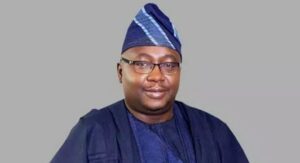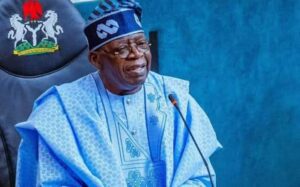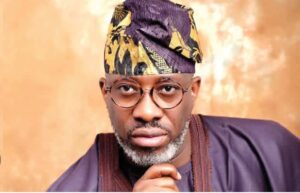George Agbakahi: Pat Utomi and his jaundiced assessment of Tinubu
In recent times, there has been a widespread debate over whether or not President Bola Ahmed Tinubu is physically fit and mentally sound to be president. Well, it has been proven again and again that not only is he medically fit, but also eminently competent.
In furtherance of this baseless debate, my attention has been recently drawn yet again to a commentary credited to Pat Utomi, a chieftain of the Labour Party, wherein he postulated that President Tinubu is not fit and healthy to be president because of his age.
In response to this ill-conceived supposition, it is important to address both the subject matter and the achievements of President Tinubu within his first month in office. While age may be a factor to consider in leadership, it should not be the sole determinant of a leader’s capabilities. Many leaders around the world, including President Biden, former President Trump, former US speaker of House of Representatives, Nancy Pelosi, Senator Diane Feinstein of California, the Indian Prime Minister, and the Brazilian President, to mention but few are over 70 or 80 years old. These leaders continue to serve their respective nations effectively, demonstrating that age is merely a number when it comes to leadership.
According to classical theories, the effects of age on leadership are multifaceted, encompassing both strengths and limitations. The theories reaffirm that older leaders tend to possess more experience and knowledge, which can enhance decision-making and problem-solving abilities. Age is associated with increased emotional stability and maturity, allowing leaders to handle challenging situations with composure.
Juxtaposing these great qualities of strong decision-making ability with the achievements of President Tinubu within his first month in office, you will appreciate the several significant reforms and actions undertaken.
Therefore, it is important to highlight some of these accomplishments to provide a comprehensive overview of his performance.
Electricity Sector Reforms:
President Tinubu signed the Electricity Act 2023 into law, which seeks to promote private sector investments in the power sector. The new law allows for the disaggregation or unbundling of the generation and distribution sectors of electricity, enabling states and private investors to invest in the power sector. This reform opens up opportunities for greater participation and competition, ultimately leading to improved access to electricity for Nigerians and the permanent elimination of exploitative estimated monthly billing.
Removal of Fuel Subsidy:
President Tinubu made a bold and necessary move by removing the fuel subsidy, a long-standing policy that hindered Nigeria’s economic growth and perpetuated corruption. This decision demonstrates his commitment to tackling economic challenges head-on and prioritising the long-term development of the country. While the removal of the subsidy led to a temporary increase in fuel prices, it is a crucial step toward creating a
more sustainable solution to our energy challenges and transparent economic system. Additionally, with the recent commissioning of the Dangote Refinery in Lagos, local production is expected to be boosted, ensuring that fuel prices are not projected to remain elevated for the near future.
Tax Reforms: President Tinubu has also implemented tax reforms that aim to make the tax system fairer and more efficient. By creating a more equitable tax structure, President Tinubu is ensuring that the burden of taxation is shared proportionately and that the government can gеnеratе the necessary rеvеnuе to fund essential public services. For the longest time, the country’s tax-to-GDP ratio had left more to be desired residing perpetually beneath 10%.
The need for tax reforms has also been highlighted by the general dependence of states on the monthly federal allocation without exploring options for revenue generation. A byspel of this is with Bayelsa state, one of Nigeria’s top oil and gas producers. In the year 2020, Bayelsa generated less than 10% of the over 150 billion naira in FAAC that it received.
Furthermore, a report by Dataphyte confirmed Lagos, Ogun and Rivers as the only states able to generate internal revenue capable of matching their allocations. These reforms will contribute to the overall dеvеlopmеnt of the country and provide a solid foundation for future growth of a post-oil dependent economy.
Exchange Rate Unification:
Moreover, President Tinubu has taken decisive action to address the issue of multiple exchange rates by unifying the exchange rate, which will provide stability and boost investor’s confidence in Nigeria’s economy. This move will contribute to attracting foreign investment and fostering economic growth in the long run. By prioritising economic reforms, President Tinubu has demonstrated his understanding of the importance of creating an enabling environment for businesses to thrive and for job opportunities to be created. Though it must be said; the unification policy has caused short-term inflation in the demand for the dollar.
However, it has conversely revealed the true value of the naira while also relieving the Central Bank of Nigeria from the former mandatory duties of ‘dollar subsidy’ at great expense.
Judicial Reforms: In addition to these economic reforms, President Tinubu has initiated significant judicial reforms aimed at improving the efficiency and integrity of the justice system. By prioritising judicial reforms, President Tinubu is demonstrating his commitment to upholding the rule of law and ensuring equal access to justice for all Nigerians. These reforms will have a
profound impact on the overall functioning of the legal system, promoting transparency, and expediting the resolution of disputes. The true test of these legal reforms would be demonstrated with the results from the ongoing presidential elections tribunal. However, thus far there have been no indications of nepotistic tendencies demonstrated by the judiciary in favour of the president, and this has strengthened public confidence in the ongoing election tribunal.
Merit-Based Appointments: President Tinubu has made significant appointments based on merit and the principle of federal character, ensuring the interests and needs of different regions in Nigeria are adequately represented in key positions of leadership. These appointments promote inclusivity, diversity, unity, and social cohesion among Nigerians. The recent appointment of the Service Chiefs and Security Agencies are significant cases in point.
Education and Youth Empowerment:
President Tinubu has demonstrated a commitment to education and youth empowerment by initiating a student loan program. This program provides opportunities for Nigerian students to pursue higher education without financial constraints, empowering young people to contribute meaningfully to the nation’s development.
It is important to acknowledge that one month may seem like a short period, but President Tinubu has already taken giant steps toward transforming Nigeria and addressing key issues facing the nation. His achievements highlight his fitness and commitment to leading the country towards a brighter future. While concerns have been raised about his age, it is essential to recognize that age alone does not define a leader’s ability to govern effectively. Experience, competence, resilience, courage and political will are also key variables.
In examining his one-month in office, it is clear that President Tinubu has kept to his word from day one in which he promised to hit the ground running. The President has demonstrated a yearning for progress in addressing critical problems and the implementation of much-needed reforms. His actions reflect a clear vision for Nigeria’s future and a determination to bring about positive change. It is essential to recognize and support these achievements as they pave the way for a more prosperous and inclusive Nigeria.
Despite concerns raised by individuals like Pat Utomi, who are obviously politically motivated, while assiduously working for the election of Mr. Peter Obi, President Tinubu’s achievements highlight his fitness and commitment to lead the country towards a brighter future.
DR. George Agbakahi is a member of the Defunct APC Presidential Campaign Council, Media and Publicity Directorate and South East Leader, Tinubu Support Organisation




